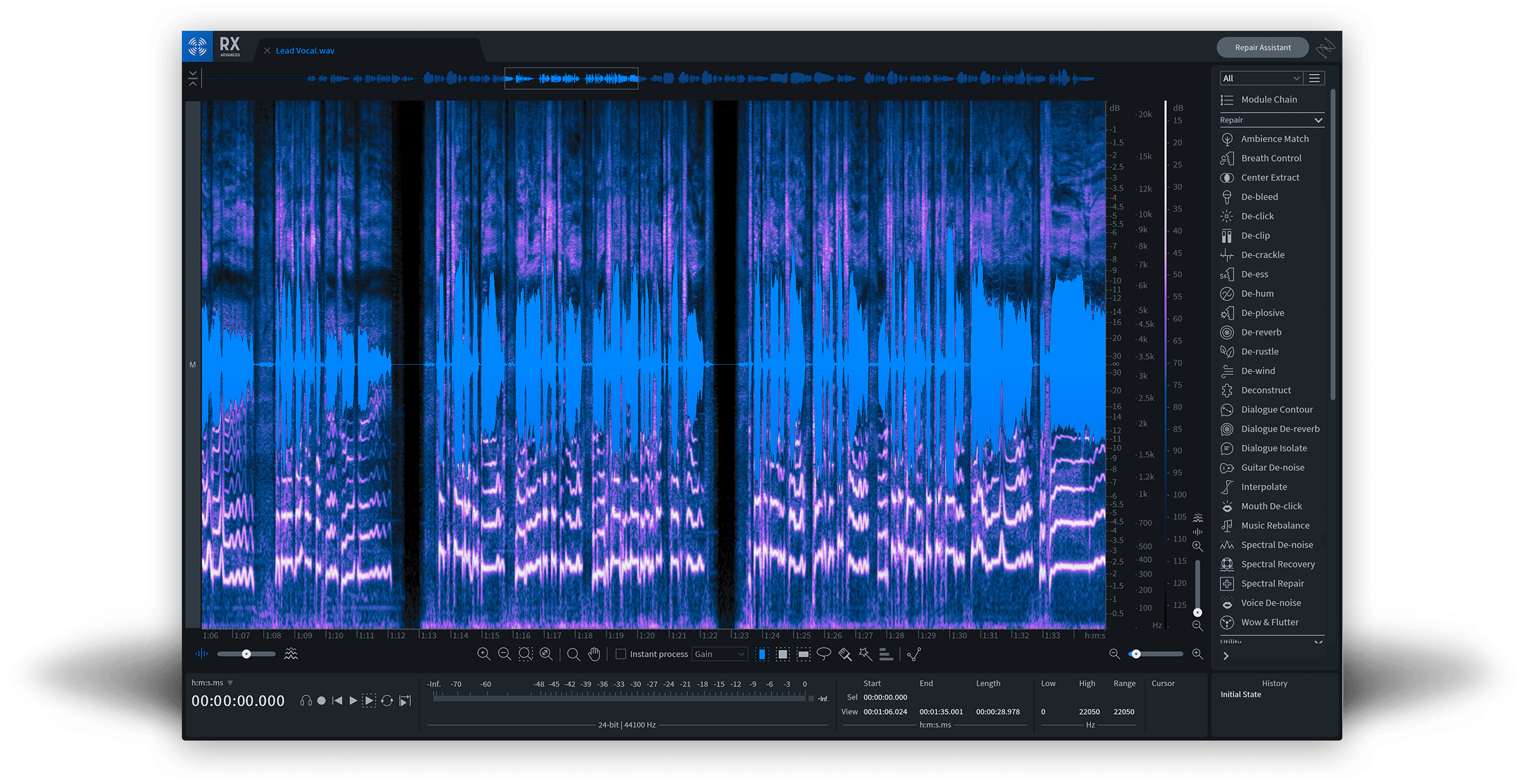Expert Guides
How to Remove Guitar Squeaks with RX 8 by iZotope Guitar De-Noise Module

How to Remove Guitar Squeaks with RX 8 by iZotope Guitar De-Noise Module
In this video tutorial, Joshua Casper uses the new Guitar De_Noise Module in RX 8 from iZotope to reduce the squeak from running fingers along guitar strings.
This is one of 3 processors in the new Guitar De-Noise Module. You can find Amp and Pick processors as well. The Amp processor will learn the amp noise and help you tame it while the Pick processor will reduce the distracting attack transients of picked and/or plucked guitar strings.
Pricing and Availability
RX 8 Audio Restoration (Affiliate Link) versions and different upgrade options (Affiliate Link) by iZotope are available at our partner Plugin Boutique.
Podcasting
How Podcasting Operates and Does It Work?
Transform your content into engaging podcasts by understanding the operational intricacies and discover the key to podcasting success.

Podcasting involves creating audio or video content, using recording software for production, and uploading files to hosting services with subscription options for automatic access. To make it work, engage your audience with interactive sessions, diverse perspectives through guest appearances, Q&A interactions, polls, contests, and social media engagement. By focusing on niche content, cultivating dedicated listeners, utilizing resources, creating unique material, and sharing across platforms, success can be achieved. Build a community through Q&A sessions, polls, social media engagement, user-generated content, and live events. Explore monetization opportunities like sponsorships, ads, affiliate marketing, subscriptions, donations, and sponsored content partnerships. Want to learn more?
Key Takeaways
- Create audio or video content using recording software.
- Save episodes as digital audio files for distribution.
- Upload files to podcast hosting service for access.
- Enable subscription for automatic episode downloads.
- Engage audience through Q&A sessions, polls, and social media.
Podcasting Process Overview
In podcasting, we create audio or video content, upload it to a hosting platform, and distribute it to listeners through RSS feeds. To start, podcasters use recording software like that developed by Dave Winer and Adam Curry to produce episodes. These tools help in editing for quality before publishing.
Once the episode is ready, it's saved as a digital audio file and uploaded to a podcast hosting service. This service generates an RSS feed, which acts as a mechanism for subscribers to access new episodes. Listeners can then subscribe to podcasts, enabling them to automatically receive new episodes, download them for offline listening, or stream them on various devices.
Podcast directories play a significant role in this process by assisting users in discovering and subscribing to podcasts based on their interests. This decentralized model allows creators to share and monetize content independently, contributing to the diverse range of shows available.
Audience Engagement Strategies

Engaging with your audience through interactive tools like Q&A sessions, polls, and contests can foster a strong community around your podcast. By soliciting feedback, questions, and suggestions, you not only encourage audience participation but also make listeners feel valued. Leveraging social media platforms is key to interacting with your audience outside of episodes, sharing behind-the-scenes content, and creating a sense of belonging. Guest appearances from experts or influencers bring diverse perspectives, attracting new audience segments and enriching the listening experience. Offering exclusive content or bonus episodes to loyal listeners as a token of appreciation for their engagement can help build a dedicated fan base. To illustrate the impact of audience engagement strategies, consider the following table:
| Audience Engagement Strategies | Benefits |
|---|---|
| Q&A Sessions | Direct interaction |
| Polls | Feedback collection |
| Contests | Engagement incentives |
| Social Media Interaction | Community building |
| Guest Appearances | Diverse perspectives |
Implementing these strategies can enhance your podcast's reach, impact, and overall success.
Podcast Success Factors

What distinguishes successful podcasts from those that struggle to gain traction?
Success in podcasting is more than just amassing a large audience; it's about creating engaging content tailored to a specific niche. While some podcasts focus on broad topics to attract a wide audience, niche podcasts cater to a smaller but highly engaged listener base.
Indie podcasts, even starting from zero listeners, can gain popularity through unique content and dedicated engagement. Podcasting's accessibility, with minimal requirements like internet connection and basic recording equipment, empowers individuals to start their own shows without facing traditional gatekeepers.
Utilizing recording software, podcast equipment, and reliable internet connections, podcasters can create compelling audio files to share on podcast hosting platforms. By emphasizing niche content, fostering engagement, and leveraging available resources, podcasters can increase their chances of success in the ever-evolving podcasting landscape.
Community Building Techniques
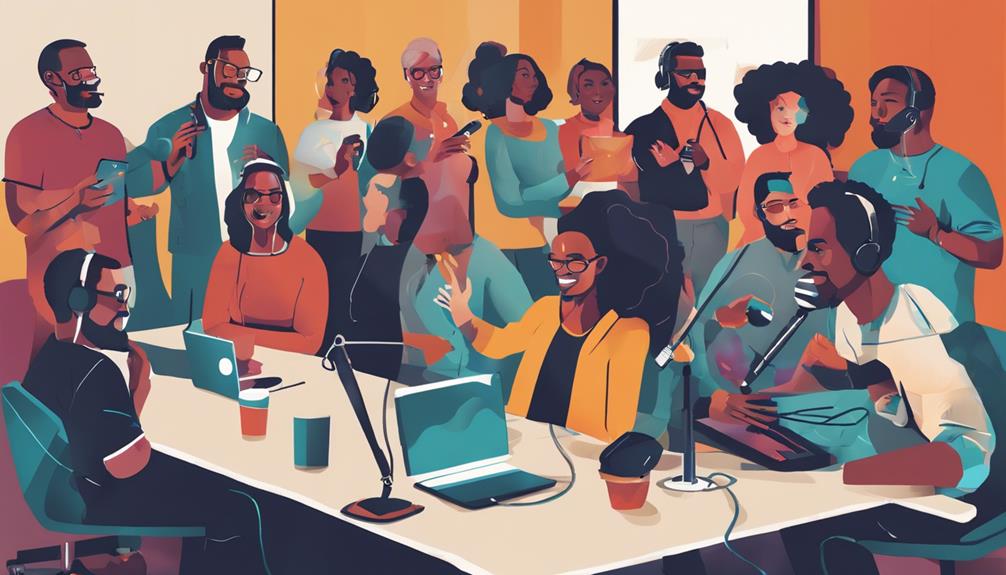
Utilizing interactive elements like Q&A sessions and polls can effectively foster a sense of community among podcast listeners. By engaging with your audience through these tools, you create a space for active participation and dialogue, making listeners feel connected and valued. Social media platforms play an important role in building the podcast community by providing a space for listeners to connect, share feedback, and discuss episodes, further enhancing the sense of belonging.
Encouraging listener participation by incorporating user-generated content, such as their stories or suggestions, adds a personal touch to your podcast and strengthens the bond with your audience. Hosting live events, virtual meetups, or webinars allows for direct interactions between hosts and listeners, creating a more intimate and engaging experience. Collaborating with other podcasters or influencers to cross-promote content not only expands the reach of the podcasting community but also brings in diverse perspectives and ideas. These community-building techniques are essential for creating a vibrant and connected podcasting community.
Monetization Opportunities

Podcasters can explore various avenues for generating income, including sponsorships, ads, affiliate marketing, premium content subscriptions, and listener donations. By partnering with brands, podcasters can earn revenue through sponsored content or product placements seamlessly integrated into episodes.
Affiliate marketing allows podcasters to promote products or services using unique tracking links and earn commissions on resulting sales. Premium content subscriptions offer listeners exclusive access to bonus episodes, ad-free content, or behind-the-scenes insights for a subscription fee, providing added value to dedicated fans.
Additionally, listener donations through platforms like Patreon or Buy Me a Coffee enable supporters to contribute directly to their favorite podcasts, fostering a sense of community and financial backing. These monetization opportunities not only support podcasters in creating quality content but also offer listeners different ways to engage and show their appreciation for the podcasts they enjoy.
Frequently Asked Questions
What Is Podcasting and How Does It Work?
Podcasting is a form of audio content distribution through RSS feeds for on-demand listening. It covers various topics like news, entertainment, and education. Listeners access podcasts on platforms such as Apple Podcasts and Spotify.
Content creators upload episodes to hosting platforms for distribution. Users subscribe to podcasts for automatic episode updates. Podcasting operates through a subscription model.
Who Pays You When You Have a Podcast?
When you have a podcast, sponsors and advertisers typically pay us for promoting their products or services during our episodes. The rates we receive can vary based on factors such as our audience size, niche relevance, and how engaged our listeners are.
Some podcasters also receive direct financial support from listeners through platforms like Patreon or crowdfunding campaigns. Successful podcasts with a large and dedicated audience can attract lucrative sponsorship deals and generate significant income streams.
How Does Someone Listen to a Podcast?
We listen to podcasts by using apps like Apple Podcasts, Spotify, or Google Podcasts. Subscribing to shows guarantees we receive updates on new episodes. These podcasts are accessible on many devices, from smartphones to smart TVs. We can stream them online or download for offline listening.
The apps offer features like playback controls, episode suggestions, and personalized show recommendations. It's a convenient way to enjoy audio content tailored to our interests.
How Do Podcasters Make Money?
We make money as podcasters through sponsorships, ads, and affiliate marketing. Offering premium content or bonus episodes for a fee and utilizing crowdfunding platforms like Patreon are common methods.
Selling show-related merchandise is another way to generate income. Building a loyal audience attracts advertisers seeking to connect with their target demographic, leading to revenue opportunities.
These strategies help sustain our podcasting ventures and support our creative work.
Conclusion
To sum up, podcasting operates through a series of steps that involve:
- Creating engaging content,
- Building a community of listeners, and
- Exploring monetization opportunities.
By implementing audience engagement strategies and focusing on key success factors, podcasters can effectively grow their audience and reach their goals.
With the right techniques and dedication, podcasting can be a rewarding platform for sharing knowledge and connecting with others in a meaningful way.
Podcasting
How Much Money Can You Make Podcasting?
Buckle up to discover the wide range of earnings in podcasting and explore lucrative strategies for maximizing your podcast revenue potential.

In podcasting, earnings can vary widely. Successful podcasters like Joe Rogan and Karen Kilgariff & Georgia Hardstark make $500-$900 per episode with about 10,000 downloads, showcasing the income potential for newcomers. Top earners like Joe Rogan, Dax Shepard, and Bill Simmons earn substantially through diverse monetization strategies. To maximize revenue, focus on robust marketing, diverse income streams, and competitive sponsorships. Methods like sponsorships, ads, affiliate marketing, merchandise sales, and premium content play key roles. Podcast ad revenues hit $1.8 billion in 2022, set to double by 2025. Various tools and strategies can enhance monetization, offering multiple avenues for increased earnings.
Key Takeaways
- Podcasters can earn $500 to $900 per episode with 10,000 downloads.
- Top podcasters like Joe Rogan showcase substantial revenue streams.
- Diversify income with sponsorships, affiliate marketing, and merchandise sales.
- Utilize podcast advertising networks and affiliate marketing for revenue.
- Revenue growth trends predict doubling podcast ad revenues by 2025.
Average Earnings of Podcasters
When podcasting, average earnings can range from $500 to $900 per episode for podcasters with around 10,000 downloads. While this may seem modest compared to top earners in the industry, it showcases the income potential for those starting out or building their audience. Successful podcasters like Joe Rogan and Karen Kilgariff & Georgia Hardstark demonstrate that with the right strategies, podcasting can become a lucrative source of income, with some earning millions annually.
To increase earnings, podcasters need to focus on audience engagement and effective monetization techniques. Consistent delivery of valuable content and building a strong connection with listeners are key factors in growing income over time. By understanding the dynamics of their audience and implementing monetization strategies such as sponsorships, merchandise sales, and exclusive content for subscribers, podcasters can enhance their earnings beyond the average range. The key lies in continuously evolving, adapting to audience feedback, and staying innovative in the ever-changing landscape of podcasting.
Top Earning Podcasters Analysis

Analyzing the earnings of top podcasters reveals the substantial income potential within the podcasting industry. Successful podcasters like Joe Rogan, Dax Shepard, and Bill Simmons showcase how engaging content can lead to significant revenue streams.
With top earners like Chapo Trap House and Tim Dillon demonstrating diverse monetization strategies, the podcasting landscape offers lucrative opportunities for those willing to create controversial content. These podcasters have harnessed the power of their platforms to not only entertain but also generate substantial income.
Their achievements highlight the importance of developing a strong audience base and exploring various revenue streams. By understanding the strategies employed by these top earners, aspiring podcasters can gain valuable insights into how to maximize their own earning potential in this dynamic and evolving industry.
Strategies for Maximizing Podcast Revenue

Exploring various revenue streams is vital for podcasters looking to maximize their income potential in the competitive podcasting industry. To monetize a podcast effectively, implementing robust marketing strategies is essential in attracting sponsors and advertisers.
Building a loyal listener base through engaging content and audience interaction can lead to significant revenue growth opportunities. Podcasters can also diversify their income streams by incorporating affiliate marketing, merchandise sales, and offering premium content to their audience.
Negotiating competitive sponsorship deals based on audience size and engagement metrics can help increase advertising rates and overall revenue. Consistently producing high-quality content is key to retaining current listeners and attracting new ones, ensuring sustainable revenue over time.
Ways to Monetize Your Podcast

To monetize your podcast effectively, consider leveraging podcast advertising networks for ad opportunities. These networks connect podcasters with advertisers looking to reach a targeted audience, providing a steady income stream. Brand sponsorships are another lucrative option, where companies pay to have their products or services promoted on your show. Affiliate marketing can offer commission opportunities by earning a percentage of sales generated through your unique referral links. Merchandise sales not only bring in income but also deepen listener connections through branded products. Additionally, listener donations and crowdfunding platforms like Patreon allow your audience to support your podcast financially, ensuring its sustainability. Here's a breakdown of various ways to monetize your podcast:
| Monetization Method | Description | Benefits |
|---|---|---|
| Podcast Advertising | Utilize ad networks for sponsored content placement | Reliable income stream |
| Brand Sponsorships | Partner with brands for product or service promotions | Lucrative opportunities |
| Affiliate Marketing | Earn commissions by promoting products or services through referral links | Additional revenue stream |
| Merchandise Sales | Sell branded merchandise to your audience for a personalized touch | Strengthen listener connections |
| Donations & Crowdfunding | Allow listeners to contribute financially through donations or platforms like Patreon | Ongoing financial support |
Tools for Podcast Monetization
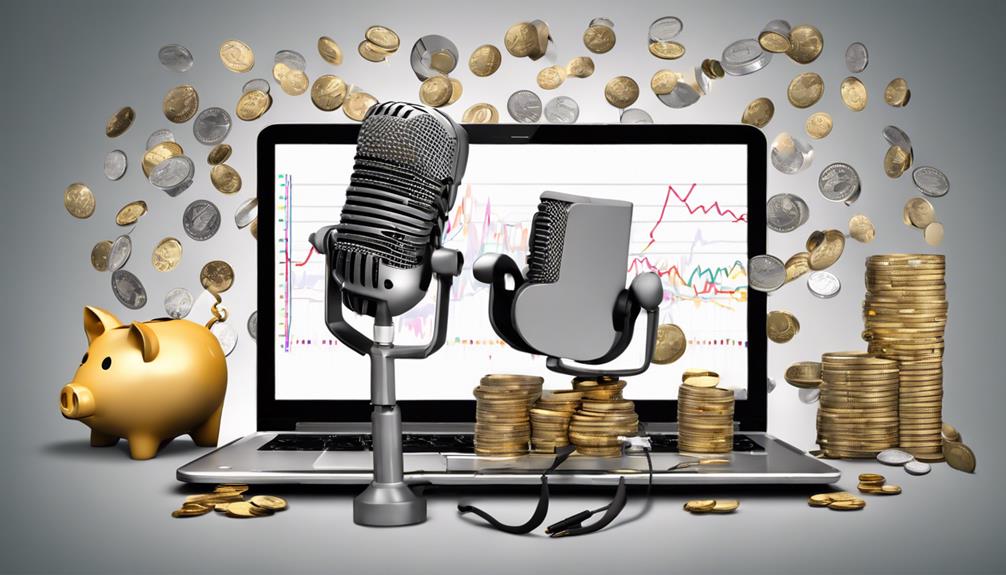
When it comes to podcast monetization, we need to explore the various tools available to maximize revenue.
Sponsorship opportunities, affiliate marketing strategies, and membership subscription models are key points to delve into for effective monetization.
These tools offer podcasters diverse ways to generate income and grow their audience base through strategic partnerships and subscription-based services.
Sponsorship Opportunities
Podcasters can tap into a lucrative revenue stream through strategic sponsorships, partnering with advertising agencies like Ad Results Media and Adopter Media. Understanding sponsor dynamics, including CPM rates and ad placement options, is vital for maximizing earnings. Negotiating higher rates with sponsors as your podcast grows can lead to increased revenue opportunities. Leveraging sponsorships effectively enhances the overall monetization strategy and contributes to financial success. Below is a table highlighting key sponsorship opportunities in podcast advertising:
| Advertising Agency | CPM Rates | Ad Placement |
|---|---|---|
| Ad Results Media | High | Midroll |
| Adopter Media | Competitive | Pre-roll |
| AdvertiseCast | Varied | Dynamic inserts |
| Midroll | Premium | In-content |
Affiliate Marketing Strategies
Exploring effective affiliate marketing strategies can greatly enhance a podcast's monetization potential by tapping into commission ranges between 5% and 30%. By joining popular programs like Audible's, podcasters can establish a steady revenue stream through commissions.
Maintaining trust with the audience is important, achieved through clear affiliate links and transparent disclosure of partnerships. Diversifying income streams through affiliate marketing not only adds value to the podcast but also aligns with audience interests and purchasing behaviors.
Successful strategies in this domain have the power to notably boost earnings, making it a valuable tool for podcast monetization. Leveraging these partnerships intelligently can lead to innovative ways of increasing revenue while keeping the audience engaged and satisfied.
Membership Subscription Models
Membership subscription models leverage exclusive content to generate recurring revenue streams for podcasters. Platforms like Patreon, Supercast, and Glow empower creators to offer bonus episodes, ad-free listening, and premium content to their audience for a monthly fee.
By providing special perks and behind-the-scenes access, podcasters can cultivate a dedicated community of loyal fans willing to support their work. These models not only offer financial stability through steady income but also foster deeper connections with listeners.
Customizable membership tiers allow podcasters to tailor offerings to different segments of their audience, maximizing the potential for revenue generation. Embracing membership subscription models opens up new possibilities for monetization and engagement, enriching the podcasting experience for both creators and listeners.
Insights Into Podcasting Income

When considering podcasting income, it's crucial to understand the various revenue streams available. These can include sponsorships, affiliate marketing, book sales, merchandise, and email ads. By exploring different monetization strategies, podcasters can maximize their income potential and reach a broader audience.
Conducting an analysis of the income potential in podcasting can provide valuable insights into how to grow a successful and profitable podcast.
Podcasting Revenue Streams
Podcasting Revenue Streams offer various avenues for podcasters to generate income through:
- Sponsorships
- Affiliate marketing
- Merchandise sales
- Listener donations
- Premium content
- Live shows
- Consulting services
- Paid subscriptions
Podcasters can tap into these monetization methods to diversify their revenue sources and maximize earnings.
Revenue sources in podcasting continue to expand, with podcast ad revenues hitting $1.8 billion in 2022 and projected to double by 2025. Specific methods such as affiliate marketing, merchandise sales, listener donations, premium content, live events, and consulting services provide podcasters with opportunities to grow their income streams.
Utilizing tools like Calendly, Spotify, Descript, and email lists can further enhance podcast monetization through consulting services, paid subscriptions, ad sales, and syndication, offering podcasters a range of options to boost their earnings.
Monetization Strategies
Exploring different avenues to monetize a podcast can greatly impact the income potential for podcasters, with strategies ranging from sponsorships to premium content offerings. By understanding audience preferences and delivering valuable content, podcasters can enhance monetization opportunities. Successful podcasting strategies involve defining a clear concept, investing in quality equipment, promoting the podcast effectively, and engaging with the audience. Here is a breakdown of common monetization strategies used by podcasters:
| Podcast Monetization | Description |
|---|---|
| Sponsorships | Partnering with brands for ad placements. |
| Ads | Inserting ads within the podcast episodes. |
| Affiliate Marketing | Earning commissions by promoting products. |
| Merchandise Sales | Selling branded merchandise to listeners. |
| Premium Content | Offering exclusive content for paid subscribers. |
Income Potential Analysis
Analyzing the income potential of podcasting reveals a wide range of earnings based on factors such as audience size and effective monetization strategies. Podcasters like Joe Rogan, Karen Kilgariff, and Dax Shepard showcase the vast spectrum of podcasting income, from thousands to millions.
By focusing on creative expression, audience engagement, and delivering valuable content, podcasters can increase their earnings. Successful podcasting involves understanding audience preferences to tailor content and explore diverse income streams.
Whether earning hundreds per episode with 10,000 downloads or millions annually like the top podcasters, the key lies in consistent engagement and strategic monetization. The dynamic nature of podcasting income offers opportunities for growth and innovation in the ever-evolving landscape of digital content creation.
Frequently Asked Questions
Can You Make Good Money With a Podcast?
Yes, we can definitely make good money with a podcast. By creating valuable content and understanding our audience, we can explore various monetization opportunities like sponsorships, ads, affiliate marketing, and merchandise sales.
Successful podcasters like Joe Rogan and Karen Kilgariff showcase the potential for significant earnings.
Consistent delivery of engaging content tailored to audience preferences can lead to a rewarding income stream in podcasting.
How Much Can an Average Podcaster Make?
In the podcasting domain, income for an average podcaster can vary greatly based on factors like audience size and engagement levels. While most podcasters earn modest sums, innovative monetization strategies can boost earnings.
To maximize income, we must understand audience preferences and consistently deliver valuable content. Successful podcasters like Joe Rogan and others rake in millions annually, showcasing the vast potential in this dynamic industry.
Is Podcasting Still Profitable?
Podcasting remains profitable, with the potential for substantial income. Engaging audiences, delivering valuable content, and exploring innovative monetization strategies contribute to profitability. Understanding audience preferences and embracing unique approaches are essential for maximizing earnings.
The podcast advertising market's projected growth to over $4 billion by 2024 further emphasizes the profit potential. By consistently providing quality content and adapting to market trends, podcasters can continue to find success in this evolving industry.
Who Is Highest Paid Podcaster?
We found out that the highest-paid podcaster currently is Joe Rogan, securing a deal worth over $200 million with Spotify.
This highlights the immense earning potential in the podcasting industry.
Conclusion
To sum up, podcasting can be a lucrative endeavor for those who put in the effort to monetize their content.
One interesting statistic is that the top earning podcasters can make upwards of $1 million per year from sponsorships, advertisements, and other revenue streams.
By implementing effective strategies and utilizing the right tools, podcasters have the potential to generate a significant income from their passion for creating engaging audio content.
Podcasting
How Does Podcasting Work?
Curious about podcasting? Learn how it works, from recording to distribution, in this comprehensive guide.
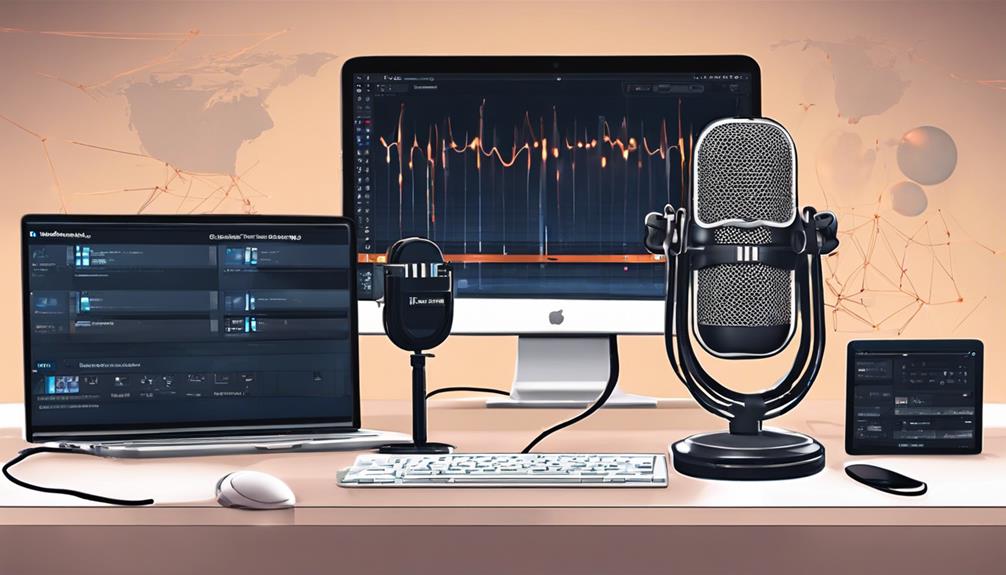
Podcasting involves creating digital audio files that become episodes distributed through hosting platforms. These platforms facilitate on-demand listening via RSS feeds for easy subscription to get new content promptly. The process begins with recording equipment for high-quality audio and includes editing to refine the listening experience. Specific tools like Audacity help in this enhancement. Vital steps include uploading episodes to the hosting service, which then generates RSS feeds for subscribers. For a thorough understanding, exploring podcasting basics, creation processes, and hosting services can enhance podcasting knowledge further.
Key Takeaways
- Create audio episodes on specific topics or genres.
- Upload episodes to a podcast hosting platform.
- Distribute episodes to various podcast directories.
- Subscribers receive new episodes via RSS feeds.
- Engage with listeners for feedback and growth.
Podcasting Basics
Podcasting Basics involve the creation of digital audio files that users can download or stream on-demand. These audio files, known as episodes, make up a podcast show that users can listen to for entertainment, education, or information. Hosting platforms play a vital role in distributing podcasts, allowing listeners to access content easily. To keep up with new episodes, users can subscribe to podcasts using RSS feeds, ensuring they never miss a show.
Creating engaging podcast content involves recording high-quality audio that captivates the audience. Podcasters act as hosts, guiding listeners through each episode with their unique style and personality. It's crucial to focus on a specific theme or topic to attract a target audience interested in that content. As the popularity of podcasts continues to grow, more creators are exploring video podcasts to enhance visibility on platforms like YouTube.
Podcast Creation Process
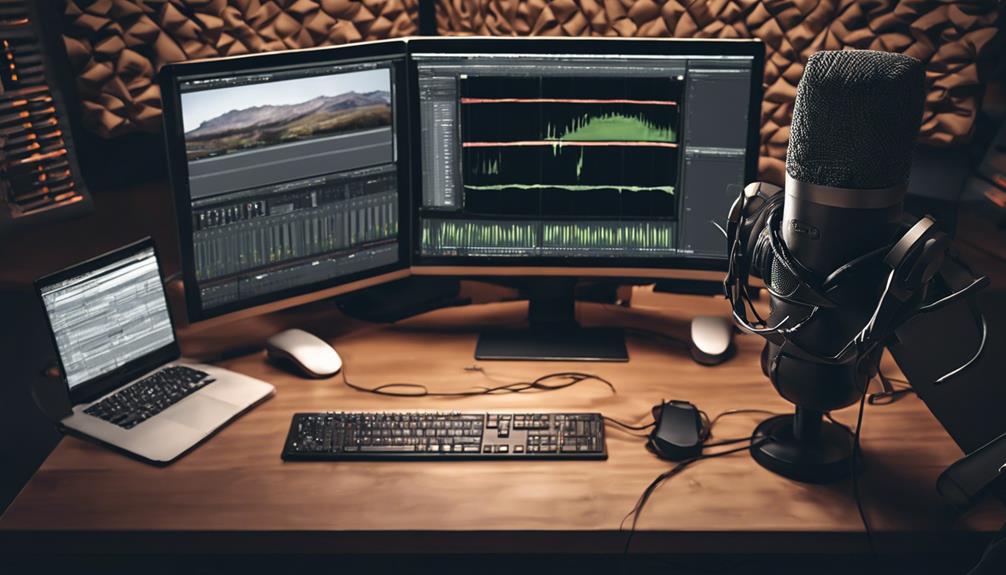
When creating a podcast, it involves recording audio content using specific equipment, editing the recordings for quality, and preparing them for distribution.
Once the audio is polished, podcasters upload their episodes to hosting services to generate RSS feeds, making it easier for subscribers to access the content.
This process includes recording equipment needs, editing and post-production tasks, and hosting and distribution strategies to guarantee a successful podcast launch.
Recording Equipment Needed
To guarantee high-quality audio recordings for your podcast, investing in a quality USB microphone is essential. While USB microphones offer convenience and plug-and-play simplicity, upgrading to XLR microphones can take sound quality to the next level.
Digital recorders provide flexibility in recording setups, allowing for on-the-go podcast production. Accessories like pop filters and microphone stands help create an ideal recording environment by reducing unwanted noise and ensuring microphone stability.
Beginners can benefit from researching equipment reviews to find the best podcasting gear for their needs. By carefully selecting the right recording equipment, podcasters can enhance their sound quality and streamline their production process, setting the stage for a successful podcasting journey.
Editing and Post-Production
In our podcast creation process, we enhance our audio content through meticulous editing and post-production techniques. Using advanced editing software like Audacity or Adobe Audition, we refine audio content, enhance quality, and insert flow enhancements to create a smooth listening experience for our audience.
Post-production tasks such as balancing audio levels guarantee that each podcast episode meets our high standards. By focusing on these details, we elevate the production value of our podcast, engaging listeners and fostering a loyal audience.
The efforts put into editing and post-production play a vital role in delivering a professional and engaging podcast that aligns with our brand's identity and keeps our audience coming back for more.
Hosting and Distribution
Moving on from the meticulous editing and post-production stage, our podcast journey now ventures into the domain of hosting and distribution, essential components of the podcast creation process.
When it comes to podcast hosting platforms, services like Buzzsprout and Podbean play an important role in storing and distributing digital audio files for podcasters. These platforms also generate the podcast RSS feed, which automatically updates subscribers with new episodes.
Additionally, podcast directories such as Apple Podcasts and Spotify serve as key distribution channels, allowing listeners to discover and access a wide range of podcasts easily. This process of uploading audio content, setting up distribution channels, and engaging with listeners forms an integral part of the podcast creation process.
Podcast Distribution Methods

Podcasts are distributed through RSS feeds, allowing subscribers to easily access new episodes. Hosting services like Buzzsprout and Podbean store podcast files and distribute them to various platforms.
Podcast directories such as Apple Podcasts and Spotify help listeners discover a wide range of podcasts.
Distribution Platforms
Among the key components of podcasting infrastructure are the various distribution platforms available to content creators and listeners alike.
- Apple Podcasts, Spotify, Google Podcasts, Stitcher, and Overcast are popular podcast distribution platforms where creators can upload episodes and submit their RSS feeds for easy access.
- Podcast directories play an important role in helping users discover new shows based on genres, topics, and recommendations.
- These distribution platforms offer customization options such as playlists, downloads, subscriptions, and notifications, enhancing the overall podcast listening experience.
The innovation in podcast distribution platforms has greatly contributed to the growth of the podcasting industry, making it easier for both creators and listeners to engage with a wide range of content seamlessly.
RSS Feeds
Utilizing RSS feeds is a vital aspect of podcast distribution methods, allowing podcasters to automatically share audio files with subscribers. When podcasters create an RSS feed for their podcast, it includes essential information about episodes such as titles, descriptions, and links to media files.
Subscribers utilize podcast apps to access these RSS feeds, enabling them to receive new episodes as soon as they're published. This seamless process guarantees that listeners stay updated with the latest content from their favorite podcasts without the need for manual intervention.
Podcast hosting platforms play an important role in generating and managing these RSS feeds, ensuring smooth distribution to subscribers through various podcast apps and directories.
Podcast Monetization Strategies
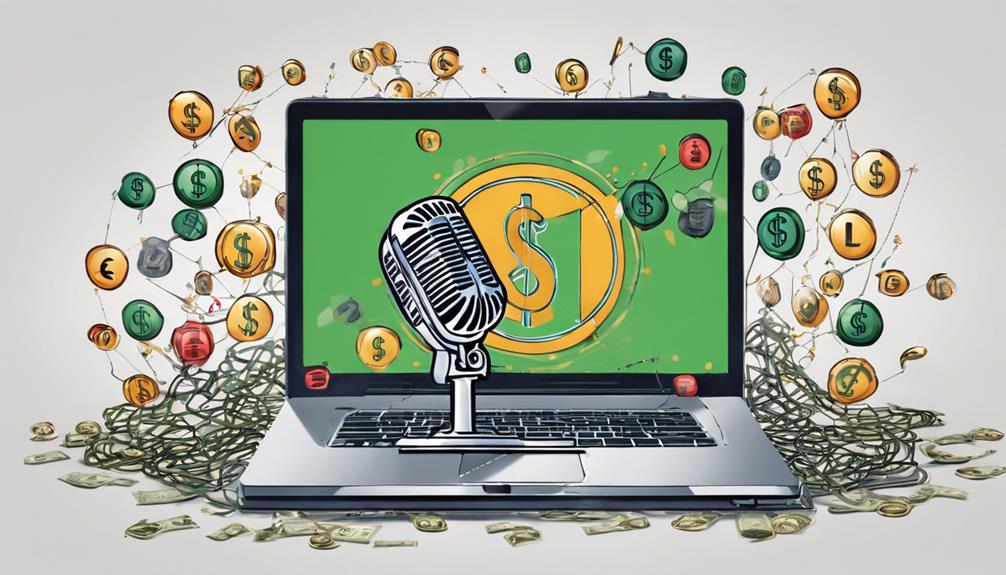
How can podcasters effectively generate revenue through various monetization strategies?
Podcast monetization strategies offer innovative ways for content creators to monetize their podcasts and cultivate a sustainable income. Here are three key methods:
- Sponsorships: Partnering with advertisers can be a lucrative way to monetize podcasts. Advertisers pay to have their products or services promoted on podcasts, providing podcasters with a steady stream of income.
- Affiliate Marketing: By engaging in affiliate marketing, podcasters can earn commissions for endorsing products or services. This strategy not only generates revenue but also allows podcasters to align with brands that resonate with their audience.
- Premium Content: Offering exclusive episodes, bonus material, or behind-the-scenes access to subscribers can create a revenue stream. By providing additional value to loyal listeners, podcasters can monetize their content while fostering a dedicated community.
Exploring these podcast monetization strategies can help content creators diversify their revenue streams and build a sustainable business model.
Podcast Equipment Essentials
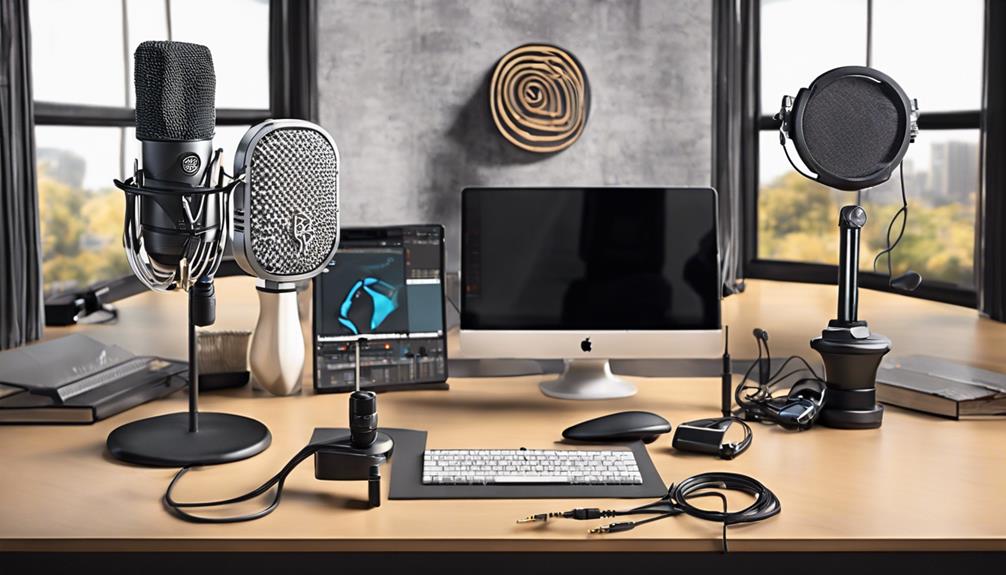
When setting up a podcast, investing in essential equipment like a quality USB microphone is essential for ensuring clear audio recording. USB microphones are user-friendly and provide good sound quality, making them ideal for beginners in podcast production. For advanced sound quality, XLR microphones are preferred among podcasters looking to enhance their audio recordings.
Digital recorders offer flexibility, allowing podcasters to record episodes on the go. Accessories like pop filters and mic stands can further improve audio recording quality by reducing background noise and ensuring the microphone is properly positioned. Researching equipment reviews and recommendations is important for beginners to make informed decisions about which podcasting equipment best suits their needs.
Podcast Hosting Services

Are you searching for a reliable platform to efficiently upload and distribute your podcast episodes? Podcast hosting services like Buzzsprout and Podbean offer solutions to help you reach a wider audience and manage your podcast effectively. Here are some key features of podcast hosting services:
- Distribute Content: These services allow you to upload audio files and distribute your content across various streaming platforms, making it easily accessible to listeners worldwide.
- Analytics Tracking: Hosting services provide valuable analytics tools to track listener engagement and download metrics. This data helps you understand your audience better and tailor your content to their preferences.
- Secure Storage and Management: With secure storage options, your podcast files are stored reliably, ensuring uninterrupted streaming and downloading. You can also efficiently manage your episodes, schedules, and audience interactions through these platforms, enhancing the overall podcasting experience.
Choose a podcast hosting service that aligns with your needs and goals to maximize the potential of your podcast.
Podcast Production Steps
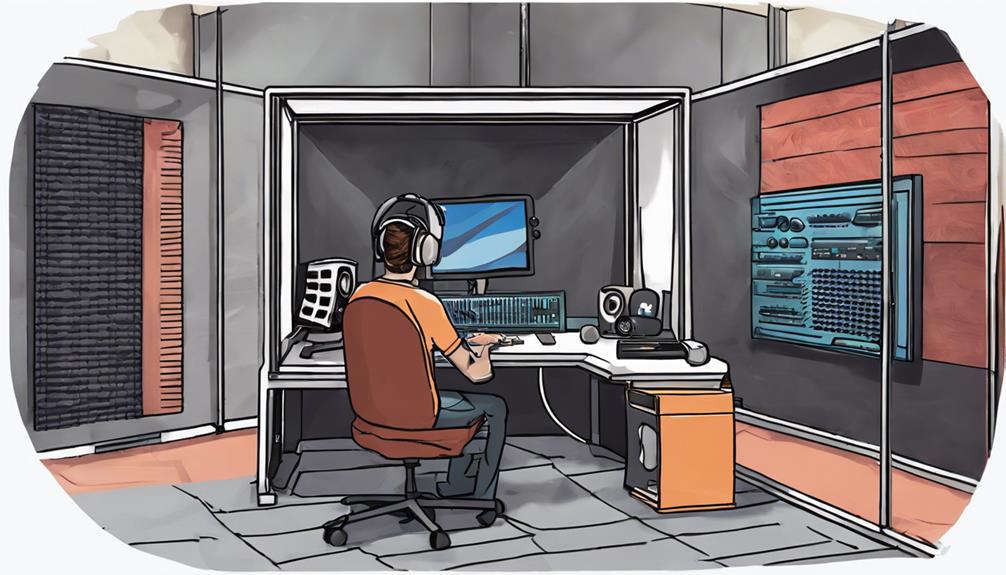
Exploring the intricate process of podcast production reveals the meticulous steps involved in creating engaging audio content for listeners worldwide. Podcast production encompasses recording audio, utilizing editing software to enhance quality, and saving the final product as an MP3 file. Podcasters rely on platforms like Audacity or Adobe Audition to refine their episodes, removing errors and incorporating music or sound effects to captivate their audience. Once production is complete, episodes are uploaded to a podcast hosting service for distribution to various platforms such as Apple Podcasts and Spotify. To make episodes more discoverable, podcasters add metadata like episode titles, descriptions, and tags. Moreover, promoting podcasts through social media sharing, email newsletters, and collaborations is essential in attracting a broader audience. By employing these production steps and promotion strategies, podcasters can effectively reach and engage with their target listeners.
| Podcast Production Steps | |
|---|---|
| Recording Audio | Editing Software |
| MP3 File | Podcast Hosting Service |
| Metadata | Episode Title |
| Social Media Promotion | Email Newsletters |
| Collaborations |
Podcast Promotion Techniques
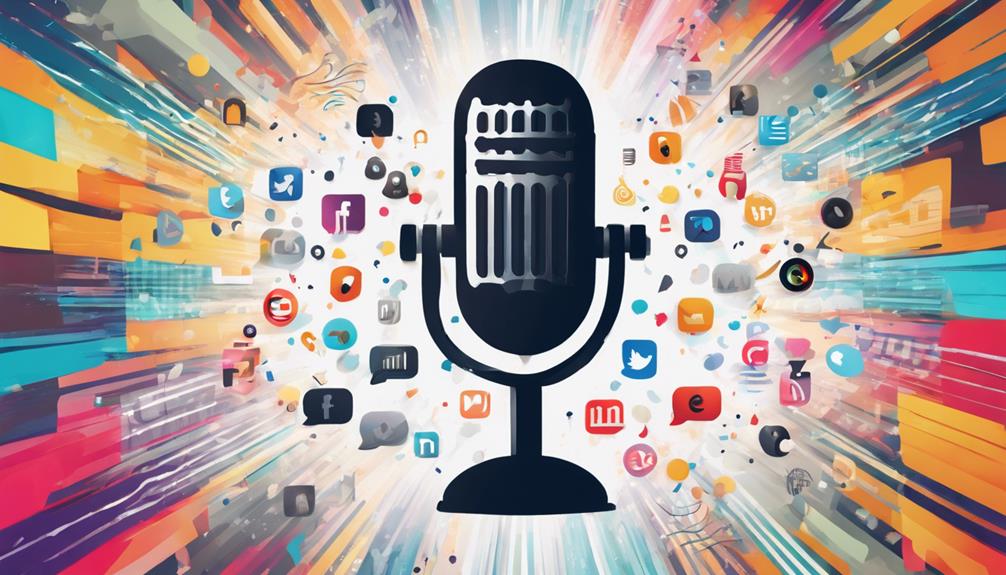
To effectively promote a podcast, utilizing social media platforms like Instagram, Twitter, and Facebook is essential for engaging with listeners and attracting a wider audience. When it comes to podcast promotion techniques, here are three innovative strategies worth exploring:
- Collaborate for Cross-Promotion: Partnering with other podcasters allows for cross-promotion opportunities, reaching new audiences, and increasing visibility in the podcasting community.
- Leverage Email Marketing: Engage with your subscribers through email marketing campaigns to notify them about upcoming episodes, special guests, or exclusive content, keeping them excited and involved.
- Implement SEO Strategies: Optimize your podcast titles, descriptions, and show notes to enhance search engine visibility and discoverability, making it easier for potential listeners to find your podcast online.
Frequently Asked Questions
How Do Podcasters Make Money?
We make money in various ways as podcasters. Sponsorships, advertising deals, listener donations, and affiliate marketing partnerships are common sources.
Additionally, we offer premium content, bonus episodes, live events, merchandise sales, and exclusive brand partnerships to bolster our revenue streams.
Diversifying income sources guarantees financial stability and growth as we connect with our audience and deliver valuable content they love.
What Is a Podcast and How Does It Work?
Podcasts are audio files that cover various topics, like news, education, and entertainment, distributed through platforms such as Apple Podcasts and Spotify. Listeners can easily access and stream episodes on devices like smartphones and computers.
Hosts create and publish content regularly, engaging with their audience through spoken episodes. This format allows for on-demand listening, offering a convenient way to stay informed or entertained on the go.
How Do You Start a Podcast for Beginners?
So, how do we start a podcast for beginners?
Well, first, choose a topic you love. Then, grab a USB mic and recording software for high-quality audio.
Next, sign up with a hosting platform like Buzzsprout. Make eye-catching cover art and catchy titles.
Spread the word on social media and directories. Engage with your audience for growth and feedback.
Happy podcasting, folks!
Do People Get Paid to Be on a Podcast?
Yes, people can get paid to be on a podcast. Compensation varies based on factors like expertise, popularity, and the podcast's budget. Payments range from flat fees to exposure and networking opportunities.
Negotiations or contracts often determine payment terms. It's common, especially for well-known guests or experts in specific fields, to receive payment for podcast appearances, reflecting the industry's diverse revenue models.
Conclusion
To sum up, podcasting is a powerful tool for sharing information and connecting with audiences worldwide.
Did you know that over 1.75 million podcasts are available online today, with the number growing every day?
By understanding the basics of podcasting, from creation to distribution and monetization, you can join the growing community of podcasters and share your voice with the world.
Explore the endless possibilities of podcasting and start creating your own unique content today!
-

 Microphone1 week ago
Microphone1 week agoUnleash Your Inner Podcaster: Discover the Best Microphone for Crisp, Clear Audio
-

 Music Theory2 weeks ago
Music Theory2 weeks agoUnlocking Nature’s Harmony: The Power of 432 Hz Frequency in Sound & Music for Enhanced Living and Well-Being
-

 Sound Design2 weeks ago
Sound Design2 weeks agoWhat Is the Difference Between a Sound Engineer and A Sound Designer?
-

 Native Instruments Kontakt2 weeks ago
Native Instruments Kontakt2 weeks agoVOCAL AI – Animated Intelligence: The Ultimate Vocal Playground
-

 Sound Design2 weeks ago
Sound Design2 weeks agoWhy Sound Engineer
-

 Composing1 week ago
Composing1 week agoMUTILATED NOISE by SampleTraxx: The Next Generation Sound Collection
-

 Expert Guides2 weeks ago
Expert Guides2 weeks agoHow Do You Become a Sound Designer
-

 Expert Guides2 weeks ago
Expert Guides2 weeks agoHow to Become a Sound Designer for Film



